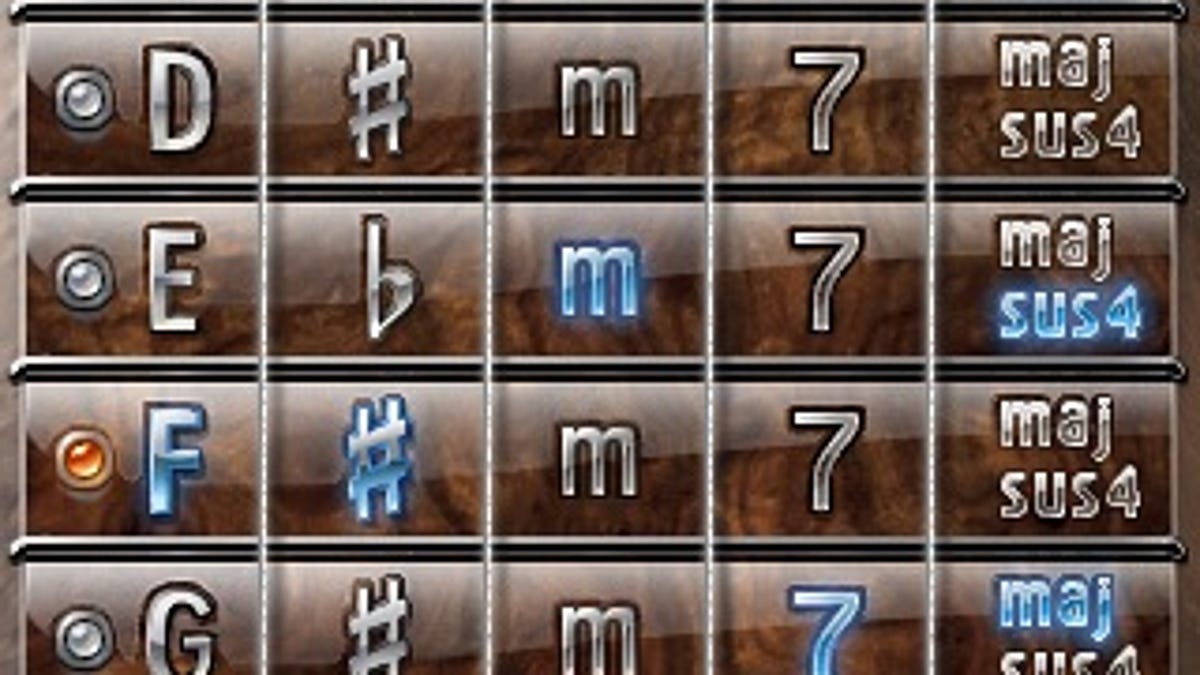Star Guitar iPhone app helps you learn guitar, write songs
Star Guitar, released by the creators of the Noise.io Pro synthesizer program, lets you "play" a virtual guitar by choosing from 144 chords and various preprogrammed rhythms. You can even record vocals.

Updated on March 28 at 12 p.m. PDT: The developers of Star Guitar explained to me that the latency between chord changes is intentional--it's meant to change on the first beat of the next measure. If you want to change it immediately, you can simply double-tap. Also, Star Guitar also records .WAV files--they're hidden at the bottom of the library list, below all the .pattern files that represent the built-in rhythms (you can edit them or create new ones on your computer). Finally, they asked me to link to the demo video on YouTube, so here it is.
I've been playing around with a new iPhone app, Star Guitar, for the last day or so, and it's a sophisticated piece of work that could help beginning guitar players learn how chords fit together into songs, as well as give more experienced songwriters a quick way to record their ideas when they don't have a guitar handy.
Released last week by Amidio, the creators of the Noise.io Pro synthesizer application for the iPhone, Star Guitar is based around a calculator-like interface that lets you choose from 144 chords.
The designers had to be very clever to fit that many chords on a single screen--essentially, you start by picking one of the seven natural-tone letters (A through G), then adding various modifications (flat or sharp, seventh, major, and suspended fourth). You might have to consult the help screen to figure out exactly which combination of buttons will create a particular chord--for example, a G6 is created by hitting "G" and "major"--but for the most part, if you know your chords, it's fairly intuitive.
If you don't know your chords, it's a fantastic way to learn what all these cryptically named chords sound like. I've played for years, but still have to think for a few seconds before I could hum you the notes in a suspended fourth. With Star Guitar, I can just play it.
But the chord chart is just the beginning--there are also a dozen preprogrammed rhythms, three guitar tones, and a tempo control. Together, these let you strum various chord progressions. If you're learning how to play and have some song transcriptions, this could help you hear how the various chords fit together into a song, without forcing you to struggle through fingering each one.
Aspiring songwriters will love the record function, which includes optional microphone recording right through the handset, or any iPhone-compatible earphones with built-in microphone. So if you're out somewhere without a guitar and inspiration strikes, you can whip out your iPhone and record a scratch "guitar" and vocal track--as long as you don't mind drawing a few stares. (Or maybe that's the point.)
Amidio has also come up with a clever way to get the recordings onto your computer without having to sync your phone to your machine or e-mail them to yourself. First, you transfer recordings from a local cache to a place called the ioLibrary. Then, you essentially set up your iPhone as a server on your local network--the application tells you the IP address--and type that address into your Web browser. Lo and behold, all the files are there in your browser, and you can right-click any of them to download them to your hard drive.
Recordings are automatically stored in Apple's Core Audio Format at a CD-quality sample rate of 44.1KHz, which is great if you've got a Mac--just open them in Garage Band. It also stores them as WAV files for PC users.
My only complaint relates to performance: in automatic play mode, there's a bit of lag between the time you press a new chord and the time it registers--it's meant to change on the first beat of the next measure, but I kept expecting it to change on the next beat. But that's a minor drawback, and if you want to change chords immediately, you can double tap.
Overall, a very impressive little application. It costs $3.99, and if you've got iTunes, you can grab it by clicking this link.